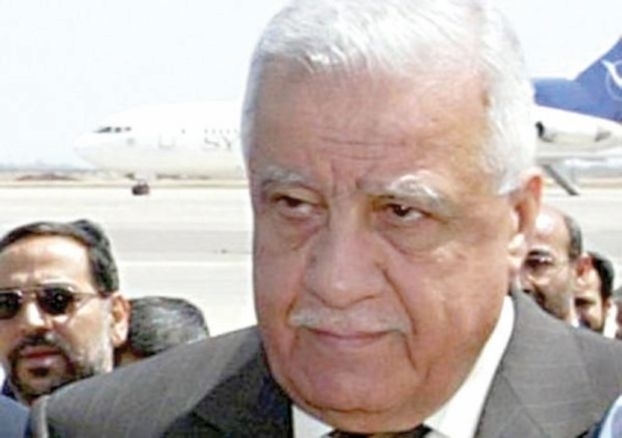Major General Mohammed Nasif Kheirbek, right-hand man to President Bashar al-Assad and "godfather" to the Syrian-Iranian military alliance, died last Sunday after a long battle with prostate cancer, Syrian state media reported. Kheirbek’s death comes at a time when Damascus’ relationship with Tehran has mutated from a ‘strategic alliance’, to one of complete dependency on Iranian military and economic support.
Following his instrumental role in Hafez al-Assad’s Corrective Revolution, which forced the late president to power in November 1970, Kheirbek was appointed head of Syria’s internal security in 1999, rising to deputy vice-president for security affairs after Bashar al-Assad succeeded his father. Kheirbek’s political and security influence often exceeded the positions he occupied due to his close relationship with the Assad family, his ties with Iran following the Islamic Revolution, and as a backchannel for successive American administrations to communicate with the Assad regimes.
Born in 1936 in the village of al-Laqbah, countryside of Hama, Kheirbek descended from a powerful Alawite family with significant tribal influence inside Syria’s elite circles. In addition to Maj. Gen. Issam Zahreddine, who served directly under Defense Minister Mustafa Tlass, Nasif was one of three officers from the Kheirbek family to play a formative role in the security and military apparatus of the Syrian regime.
Kheirbek rose to prominence in Damascus in the 1970s after he was tasked with securing relations with labor unions, Sunni merchants and prominent businessmen, while many inside the Syrian opposition have accused him of playing an operational role in the purging of the Muslim Brotherhood in late seventies and early eighties, including the 1982 Hama massacre.
As one of the architects of Assad’s "strategic balance” policy towards Lebanon’s Amal Movement and Hezbollah until Syria’s withdrawal from Lebanon in 2005, Kheirbek’s key role had always been Damascus’ liaison with Iraq and Lebanon’s Shiite political parties and militias. Kheirbek played a similar role towards Iraqi Shiite resistance groups the Islamic Dawa Party and the Supreme Council for the Islamic Revolution in Iraq prior to the US invasion of Iraq in 2003.
Zaman al-Wasl website quoted from Patrick Seale’s book, Assad: The Struggle for the Middle East, that Kheirbek was "secretive more than all the Syrian officials, he was living in his office, and was one of the very few people allowed to communicate with Assad by telephone at any time. In addition to his political position, Kheirbek was one of the most central advisers to Assad in Shiite affairs, whether in Lebanon or Iran. He was close to Moussa al-Sadr and often traveled from Damascus to Bonn and Switzerland, which were the capitals of Iranian networks in the West". According to Syrian experts, Kheirbek was very close to Bassel al-Assad at the time of his planned succession to president prior to his death in 1994, due to Kheirbek's extensive security and diplomatic experience and his extensive security information.
In 1998, Brigadier General Bahjat Suleiman succeeded Kheirbek as head of internal security, while Kheirbek was appointed to the General Intelligence Department where his power within the Assad regime proceeded to increase. Kheirbek was the only official from the "Old Guards" who worked under both Presidents Hafez and Bashar Assad, while many others left their posts following Hafez’s death in 2000. Syrian diplomat Bahjat Suleiman wrote on his Facebook page that Kheirbek was "ideal in serving his people, his country and its leaders Assad – father and son".
Following the West’s diplomatic isolation of Syria after the assassination of former Lebanese Prime Minister Rafik Hariri, Kheirbek acted as a communication channel between Damascus and Washington, while he continued to visit the US to undergo medical treatment for a heart condition.
After Farouk al-Sharaa’s appointment as Vice President in 2006, Assad assigned Kheirbek as Vice President for Security Affairs, also accompanying Foreign Minister Walid al-Muallem in his visits to Baghdad and Tehran. Remarkably, Kheirbek retained his position despite Assad’s refusal to renew the vice presidency after elections in 2014.
Following the US sanctions in 2007 for his role in the "derogation of Lebanese democracy", Kheirbek was one a handful of regime officials sanctioned by the European Union for participating in the violent suppression of protests demanding the overthrow of President Assad. Kheirbek’s enthusiasm for Alawite support in Iraqi government led to his drafting of electoral alliances, resulting in the victory of the Iraqi National List coalition, led by Iyad Allawi, in the 2010 Iraq elections. But Iranian pressure forced Damascus to accept the appointment of Prime Minister Nouri al-Maliki. Differences in opinion over the Iraqi elections exposed a rift in Kheirbek’s ties with Tehran, as Iranian officials openly voiced frustration to Assad.
Kheirbek was among a group of Syrian officials to recently visit Iran to request additional military and economic support, following a series of regime military setbacks and financial difficulties.
A close confidant of Kheirbek said: "He was with two faces: the first, a diplomat, a brilliant politician with pragmatic and cold heart; the second, a Baathist who followed authoritarian, repressive and merciless security measures".
Translated and edited by The Syrian Observer


